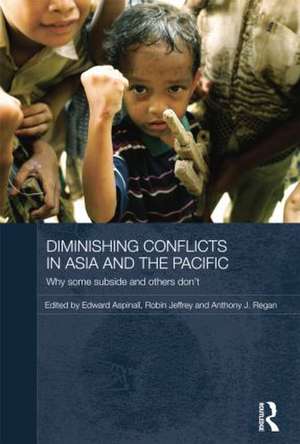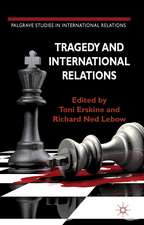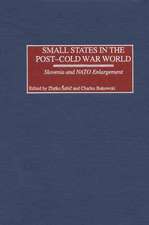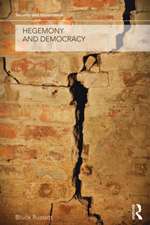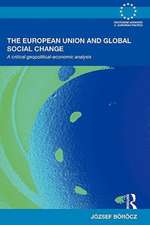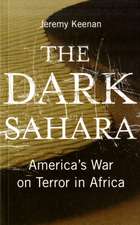Diminishing Conflicts in Asia and the Pacific: Why Some Subside and Others Don’t: Routledge Advances in Asia-Pacific Studies
Editat de Edward Aspinall, Robin Jeffrey, Anthony Reganen Limba Engleză Paperback – 12 sep 2014
In few regions has the apparent decline in conflict been as dramatic as in the Asia-Pacific, with annual recorded battle deaths falling in the range of 50 to 75 percent between 1994 and 2004. Drawing on a wide range of case studies, this book looks at internal conflicts based on the mobilization of ethnic and nationalist grievances, which have been the most costly in human lives over the last decade.
The book identifies structures, norms, practices and techniques that have either fuelled or moderated conflicts. As such, it is an essential read for students and scholars of international relations, peace and conflict studies and Asian studies.
| Toate formatele și edițiile | Preț | Express |
|---|---|---|
| Paperback (1) | 416.05 lei 6-8 săpt. | |
| Taylor & Francis – 12 sep 2014 | 416.05 lei 6-8 săpt. | |
| Hardback (1) | 1060.74 lei 6-8 săpt. | |
| Taylor & Francis – 26 sep 2012 | 1060.74 lei 6-8 săpt. |
Din seria Routledge Advances in Asia-Pacific Studies
-
 Preț: 224.67 lei
Preț: 224.67 lei - 27%
 Preț: 994.95 lei
Preț: 994.95 lei -
 Preț: 215.54 lei
Preț: 215.54 lei -
 Preț: 399.87 lei
Preț: 399.87 lei -
 Preț: 413.94 lei
Preț: 413.94 lei -
 Preț: 408.74 lei
Preț: 408.74 lei -
 Preț: 412.37 lei
Preț: 412.37 lei -
 Preț: 465.69 lei
Preț: 465.69 lei -
 Preț: 384.59 lei
Preț: 384.59 lei -
 Preț: 389.70 lei
Preț: 389.70 lei -
 Preț: 416.22 lei
Preț: 416.22 lei -
 Preț: 482.62 lei
Preț: 482.62 lei -
 Preț: 434.32 lei
Preț: 434.32 lei -
 Preț: 412.37 lei
Preț: 412.37 lei -
 Preț: 436.14 lei
Preț: 436.14 lei - 18%
 Preț: 260.93 lei
Preț: 260.93 lei - 12%
 Preț: 299.52 lei
Preț: 299.52 lei -
 Preț: 386.99 lei
Preț: 386.99 lei - 17%
 Preț: 127.19 lei
Preț: 127.19 lei -
 Preț: 310.81 lei
Preț: 310.81 lei - 5%
 Preț: 271.06 lei
Preț: 271.06 lei -
 Preț: 416.22 lei
Preț: 416.22 lei - 18%
 Preț: 1002.63 lei
Preț: 1002.63 lei - 18%
 Preț: 1334.43 lei
Preț: 1334.43 lei - 21%
 Preț: 258.91 lei
Preț: 258.91 lei
Preț: 416.05 lei
Nou
Puncte Express: 624
Preț estimativ în valută:
79.61€ • 83.34$ • 65.87£
79.61€ • 83.34$ • 65.87£
Carte tipărită la comandă
Livrare economică 05-19 aprilie
Preluare comenzi: 021 569.72.76
Specificații
ISBN-13: 9781138844674
ISBN-10: 1138844675
Pagini: 320
Ilustrații: 2 black & white tables, 17 black & white halftones, 3 black & white line drawings
Dimensiuni: 156 x 234 x 17 mm
Greutate: 0.45 kg
Ediția:1
Editura: Taylor & Francis
Colecția Routledge
Seria Routledge Advances in Asia-Pacific Studies
Locul publicării:Oxford, United Kingdom
ISBN-10: 1138844675
Pagini: 320
Ilustrații: 2 black & white tables, 17 black & white halftones, 3 black & white line drawings
Dimensiuni: 156 x 234 x 17 mm
Greutate: 0.45 kg
Ediția:1
Editura: Taylor & Francis
Colecția Routledge
Seria Routledge Advances in Asia-Pacific Studies
Locul publicării:Oxford, United Kingdom
Public țintă
Postgraduate and UndergraduateCuprins
1. Introduction: Diminishing Conflicts: learning from the Asia-Pacific Part 1: Conflict diminished? 2. Timor Leste: international intervention, gender and the dangers of negative peace 3. Maluku: anomie to reconciliation 4. Aceh: democratization and the politics of co-option 5. Solomon Islands: from uprising to intervention 6. Punjab: federalism, elections, suppression 7. Sri Lanka: the end of war and the continuation of struggle Part 2: Conflict deferred? 8. Bougainville: conflict deferred? 9. The Chittagong Hill Tracts (CHT): diminishing violence or violent peace? 10. Eastern Burma: long wars without exhaustion 11. Fiji: the politics of conflict reduction Part 3: Conflict undiminished? 12. Southern Thailand: marginalization, injustice and the failure to govern 13. Pakistan’s Federally Administered Tribal Areas: cause or symptom of national insecurity? Paul 14. Southern Philippines: the ongoing saga of Moro separatism 15. Kashmir: placating frustrated people 16. The Southern Highlands of Papua New Guinea: conflict ignored 17. Conclusion: Lessons
Notă biografică
Robin Jeffrey is a Visiting Research Professor in the Institute of South Asian Studies at the National University of Singapore. His research interests include India and South Asia, as well as the Punjab insurgency.
Edward Aspinall is a Senior Fellow in the Department of Political and Social Change, Australian National University. His research focuses on comparative politics of democratization, ethnic politics and nationalism, and he has published widely in these areas.
Anthony Regan is a Fellow in the State, Society and Governance in Melanesia Program, Australian National University. He is a constitutional lawyer who has advised in peace processes and post-conflict constitution-making processes in a number of countries, and written extensively on a number of those cases.
Edward Aspinall is a Senior Fellow in the Department of Political and Social Change, Australian National University. His research focuses on comparative politics of democratization, ethnic politics and nationalism, and he has published widely in these areas.
Anthony Regan is a Fellow in the State, Society and Governance in Melanesia Program, Australian National University. He is a constitutional lawyer who has advised in peace processes and post-conflict constitution-making processes in a number of countries, and written extensively on a number of those cases.
Descriere
Since the publication of the 2005 Human Security Report, scholars and policy-makers have debated the causes, interpretation and implications of what the report described as a global decline in armed conflict since the end of the Cold War. Focusing on the Asia-Pacific region, this book analyses the causes and patterns of this decline.
